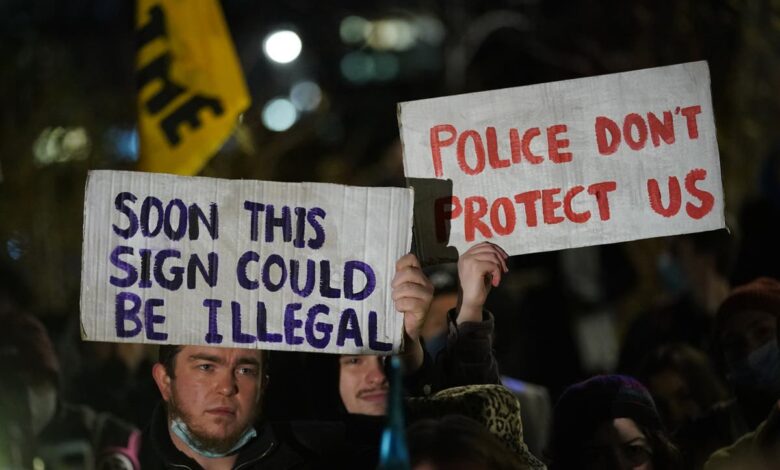Female protesters fear policing bill will ramp up officers violence against them

Female protesters have raised fears the policing bill will increase officers violence towards them as they warned the legislation could embolden some police officers to be more misogynistic and racist.
Campaigners told The Independent it is particularly worrying the controversial legislation that became law at the end of April was rolled out in the context of officers being criticised for failing to root out violence against women within their own ranks.
The policing act has been widely criticised by campaign groups for rolling back human rights – with opponents warning the legislation cracks down on citizens’ right to protest as well as compounding problems of over-policing and the criminalisation of marginalised communities.
Silkie Carlo, director of Big Brother Watch, a leading civil liberties campaign group, told The Independent: “The issue is that women have always relied on protests and demonstrations to further our rights and are also more at risk of excesses of police powers.”
Ms Carlo noted the policing bill was introduced against the “backdrop of very well-documented abuses of police powers” and “police violence against women”. The legislation is particularly worrying given future years will see increasing protests and unrest over the cost of living crisis, as well as environmental and social justice campaigns, she added.
Ms Carlo said: “The bill is a protest crackdown bill. It can make almost any regular protest and demonstration illegal. A lot of people will enter into protest situations with anxiety. If the police want to arrest them, there is a possibility that might happen – they might be deemed to be making too much noise or disruption.”
The campaigner warned the policing bill “will have a broad chilling effect” on citizen’s rights – voicing concerns the legislation will make protest less readily accessible.
She added: “We are able to make change by locking on, by causing amounts of disruption and holding protests. Unfortunately, the women who will do that will face arrests and prosecutions.
“The prosecutions of women at the vigil for Sarah Everard are such a clear example of how – even before the policing bill – women can so easily be prosecuted for protest”.
According to the government, the policing act will “strengthen police powers to tackle non-violent protests that have a significant disruptive effect on the public or on access to parliament”.
The Police Bill Alliance, a loose coalition of more than 350 UK organisations who are against the legislation, referred to the legislation passing the last parliamentary hurdle as “a dark day for democracy”. While Liberty, a human rights charity, branded the policing bill as “discriminatory and authoritarian”.
Police are handed more powers to shut down peaceful but “noisy” protests under the legislation, as well as keep tabs on activists and criminalise them. However, the Lords put forward a slew of amendments culling some of the most fiercely criticised anti-protest elements in the legislation.
Patsy Stevenson, whose photo went viral after her arrest at a vigil for Everard, told The Independent the policing bill removes citizens’ “human rights” and “freedom of expression”.
The 29-year-old built up a profile after police pinned her to the ground while she was being arrested at a vigil in Clapham in south London in March last year to remember Everard, who was kidnapped, raped and murdered by serving Met Police officer Wayne Couzens.
Ms Stevenson, who launched legal action against the police, said: “Protesters are supposed to be disruptive and noisy. Even if we did a peaceful protest, the bill gives police the right to decide whether they deem it lawful or not.”
The activist, who is from Essex but now lives in Surrey, said she is particularly worried about going to protests in the wake of the policing bill becoming law as she predicted others would feel similarly.
“What do we do if we stop fighting for our human rights?” she added. It becomes a dictatorship. Before this bill was in place, the police abused their powers and made unlawful arrests. The police were sexist, racist, misogynist and transphobic”.
Ms Stevenson, who is a physics student, warned these issues could rise under the policing bill – adding officers “will be emboldened”. The activist said police officers recognise her at protests as she claimed they “stare” her “down”.
“They look to their other police mates and point me out,” she added. “I think they are a bit too scared to say something untoward or be heavy-handed with me as they know there is the potentiality for me to sue them.”





